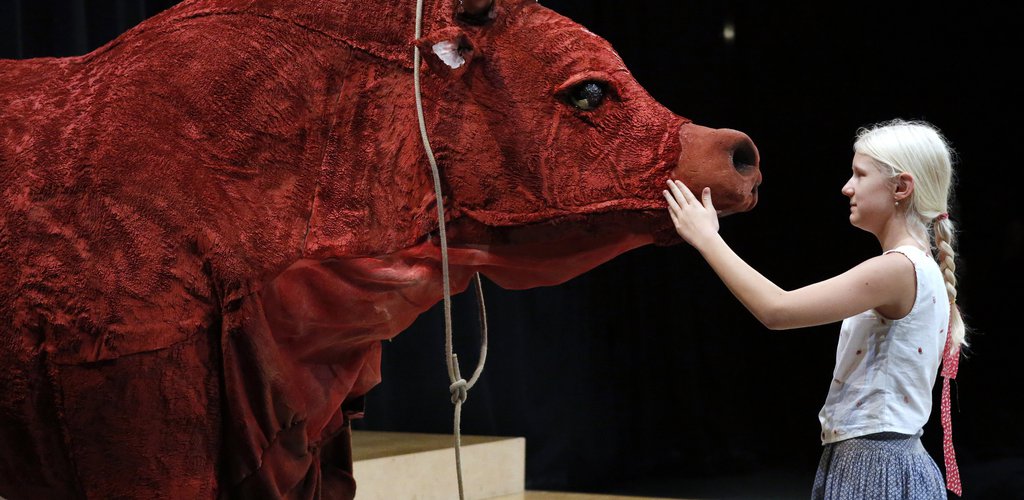“Prior to the performance, the audience must be thoroughly briefed on the history of the Tiszaeszlár Affair” – ends Iván Fisher’s foreword to his partiture and, as he desired, a stage discussion introduced the repeated performance of the single-act opera at the Vígszínház on 23 June, after last year’s success. Géza Komoróczy and the composer-conductor himself gave an account of the blood libel, the era and figures in the work in a colourful and informative manner, preparing the audience to receive the Tiszaeszlár opera well-informed. An opera, however, that seemingly did not want to start: first, Gyula Krúdy (more precisely, József Gyabronka) imitated a recitativo as an Evangelist, which was followed by a number of folk songs and a “csárda” (traditional Hungarian inn) scene. Somewhere in the second quarter of the performance the opera’s first “original” song, a chanson-like lament, was sung, reminding us of the sounds of Ferenc Darvas’ improvisations standing next to a pianino. Matching the anti-Semitic frenzy and light music is a funnily sour and postmodern gesture, but it truly maintained our feeling of missing something, which disrespectfully made us mutter the question: excuse me, is this already the opera?
Then the aria of the inn-keeper lady, who is some sort of main character, obviously put us into the world of opera with her genre parody while (one of) the Red Heifer(s) (Orsolya Sáfár) sang coloraturas about Baron Rothschild and the Neues Pester Journal. Some awkward imitation of a rap, then a musically uninteresting Kossuth-monologue with stage-play accents, the courtroom scene orchestrated for vuvuzelas and a football grandstand, followed by a beautifully sung and danced hasidic nigun. Now almost at the very end of the opera, but both the quantity and quality of the music played and sung up to that point was problematic: whatever had an impact was not original – and vice versa. In addition, the original material is only a few minutes of music, obviously too little even for a single-act opera. Of course, in such a case we cannot speak of quantities prescribed and required by authorities, but still we secretly feel amongst the audience that this is all just a mixed taster, a musical buffet. The composer, Iván Fischer, might have sensed all this too, therefore the last minutes of the opera, the Purification scene, is characterised by true invention: the accompanying drum imitating a train, and orchestra sessions playing Mahler’s, Strauss’ and Bartók’s memory fragments.
Tamás Ascher and Kriszta Székely’s joint directing also featured well-shaped but weak implementation, which strove to conceal the lack of intellectual and artistic energies with well-choreographed dynamics of group scenes. A sarcastic truism here, another truism with a raised index finger there – all this is as much of a theatre performance as The Red Heifer is an opera. József Gyabronka’s loitering on the stage is still excellent and proves he is an outstanding actor, opera singer János Tóth’s figure and skilled movements continue to be a treasure today just like three decades ago, and the adolescent perplexity of the actor boy (Jonatán Kovács) playing Móric Scharf is quite moving. The Festival Orchestra and the parts attached to it still perform superbly conducted by Iván Fischer.
Kálmán Mikszáth (who otherwise reported on the hearings of the blood libel trial back then) recorded in one of his literary sketches how fantastically successful Count Gyula Andrássy jr. was with his maiden parliamentary speech and then Mikszáth taught us a lesson about what would have happened if the same speech had been delivered by the unknown András Gyula instead of Gyula Andrássy. This critic is pondering over something similar too. Because it is almost unpredictable what would be left of The Red Heifer if we removed the name of Iván Fischer, Tamás Ascher or the poet Lajos Parti Nagy and their justly earned popularity from it.
Still, is it a problem if big names (and of course the topic and the cause itself) turn a production into a success? I believe it is. If I think that an opera has to be good enough to “survive” even if the composer is absent, I am even more strongly convinced to adopt this unpopular standpoint of mine.


